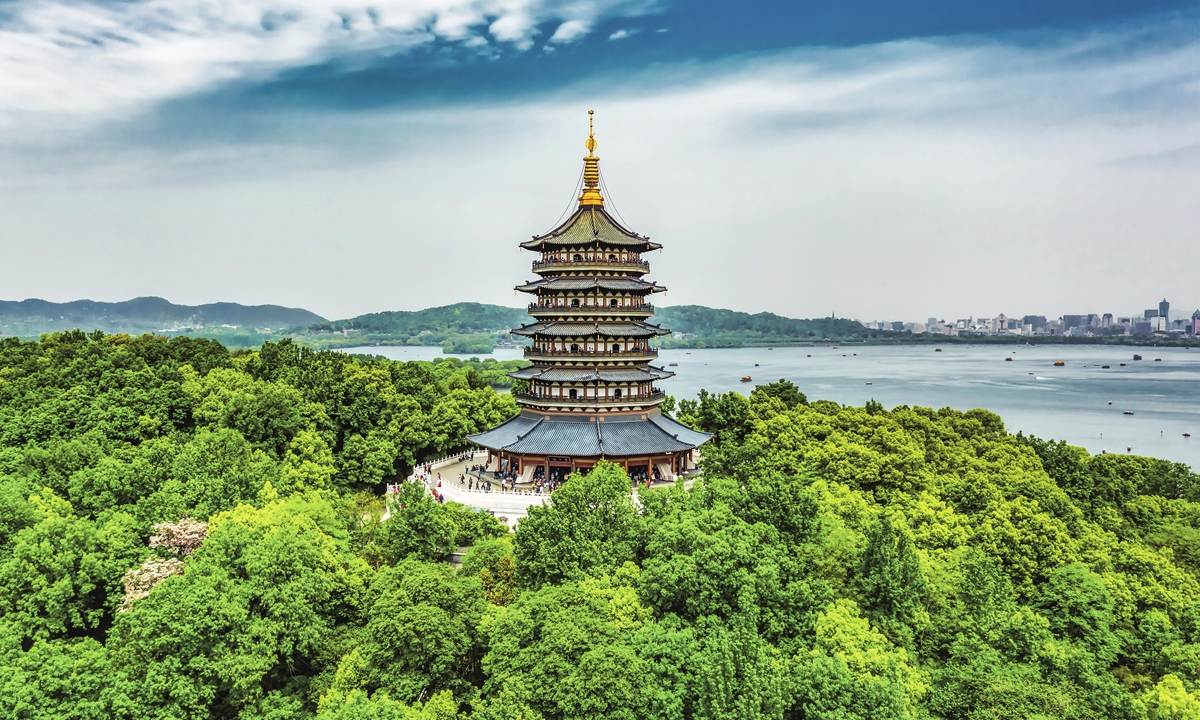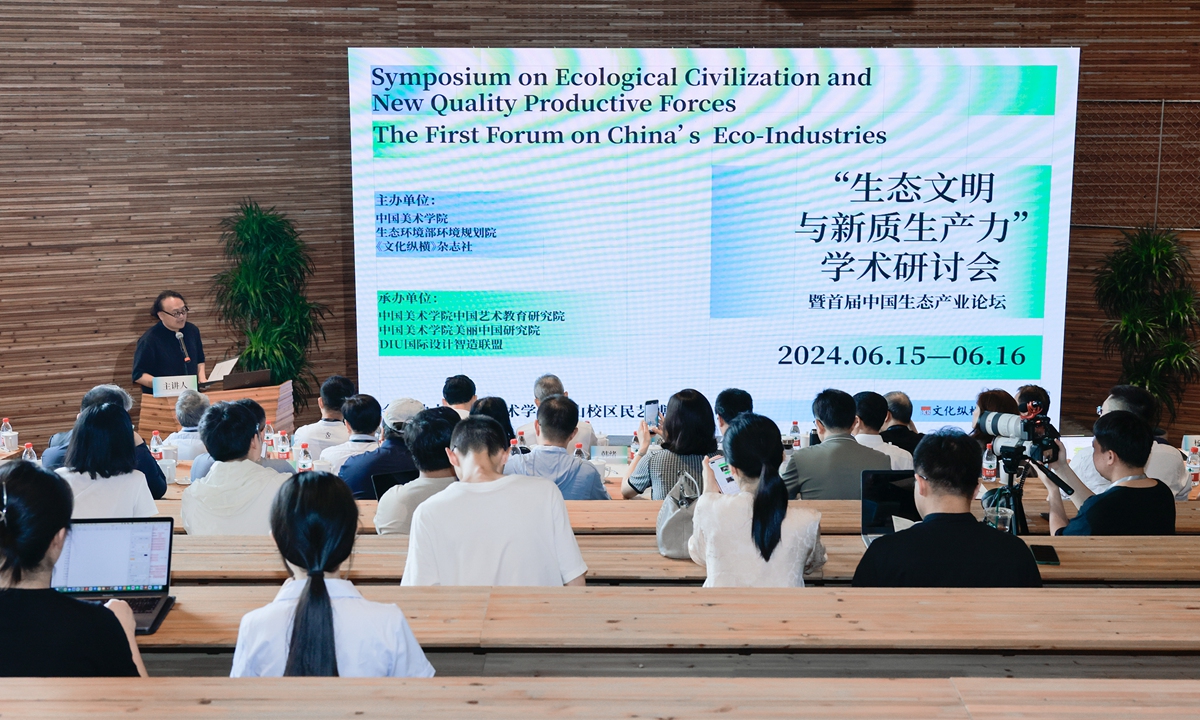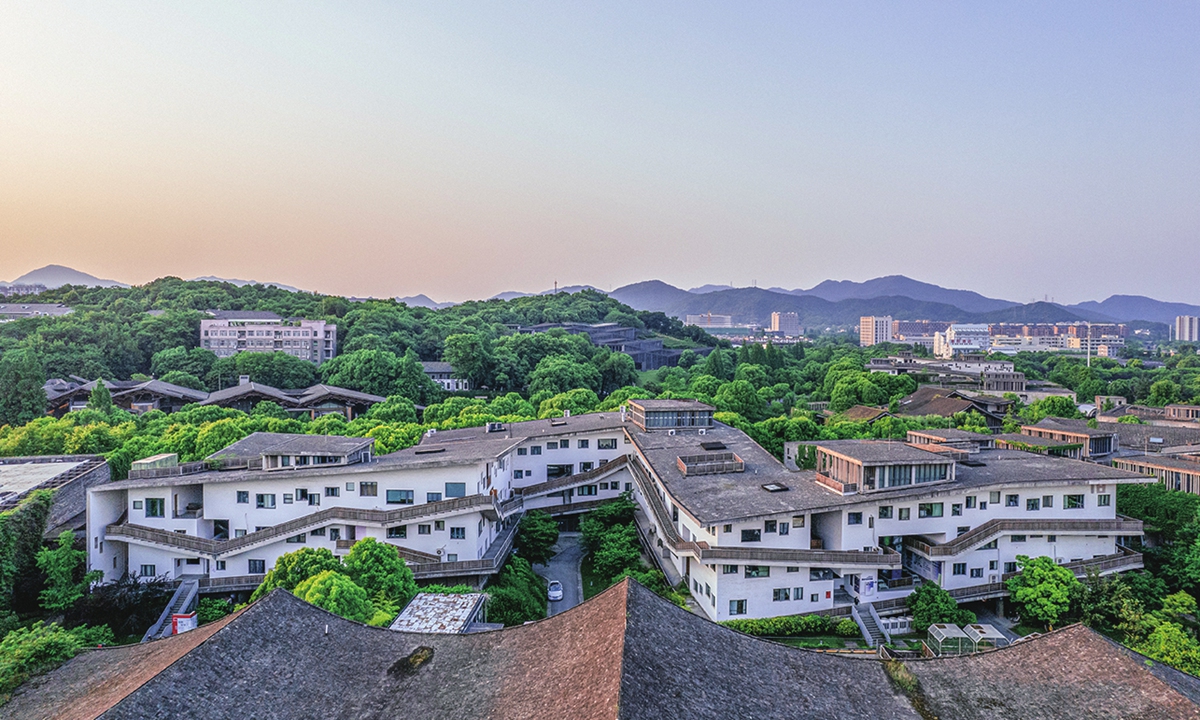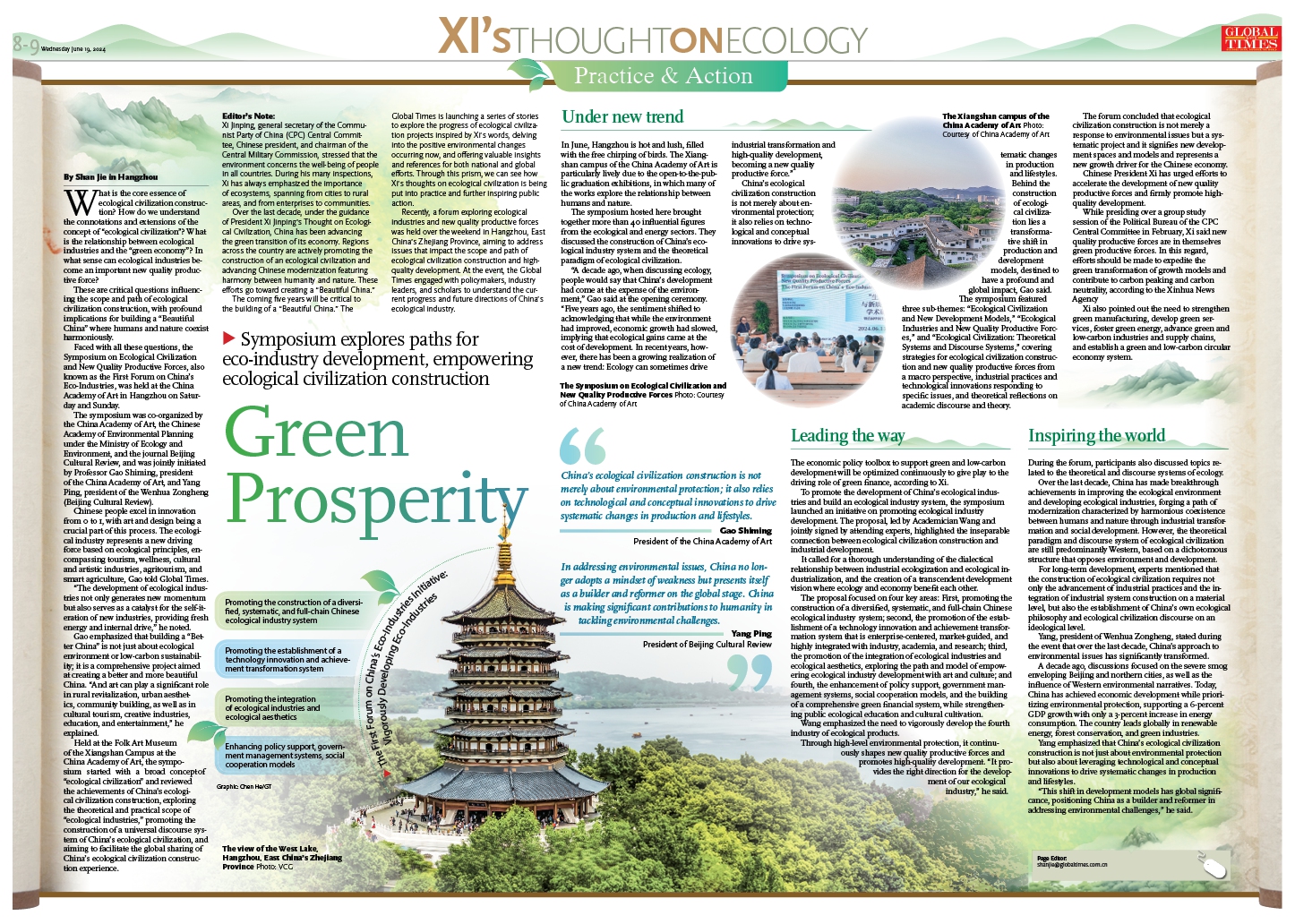Editor's Note:
Xi Jinping, general secretary of the Communist Party of China (CPC) Central Committee, Chinese president, and chairman of the Central Military Commission, stressed that the environment concerns the well-being of people in all countries. During his many inspections, Xi has always emphasized the importance of ecosystems, spanning from cities to rural areas, and from enterprises to communities.
Over the last decade, under the guidance of President Xi Jinping's Thought on Ecological Civilization, China has been advancing the green transition of its economy. Regions across the country are actively promoting the construction of an ecological civilization and advancing Chinese modernization featuring harmony between humanity and nature. These efforts go toward creating a "Beautiful China."
The coming five years will be critical to the building of a "Beautiful China." The Global Times is launching a series of stories to explore the progress of ecological civilization projects inspired by Xi's words, delving into the positive environmental changes occurring now, and offering valuable insights and references for both national and global efforts. Through this prism, we can see how Xi's thoughts on ecological civilization is being put into practice and further inspiring public action.
Recently, a forum exploring ecological industries and new quality productive forces was held over the weekend in Hangzhou, East China's Zhejiang Province, aiming to address issues that impact the scope and path of ecological civilization construction and high-quality development. At the event, the Global Times engaged with policymakers, industry leaders, and scholars to understand the current progress and future directions of China's ecological industry.

The view of the West Lake, Hangzhou, East China's Zhejiang Province Photo: VCG
What is the core essence of ecological civilization construction? How do we understand the connotations and extensions of the concept of "ecological civilization"? What is the relationship between ecological industries and the "green economy"? In what sense can ecological industries become an important new quality productive force?
These are critical questions influencing the scope and path of ecological civilization construction, with profound implications for building a "Beautiful China" where humans and nature coexist harmoniously.
Faced with all these questions, the Symposium on Ecological Civilization and New Quality Productive Forces, also known as the First Forum on China's Eco-Industries, was held at the China Academy of Art in Hangzhou on Saturday and Sunday. The symposium focused on the theme of transforming ecological resources into economic assets and issued an initiative to promote the development of ecological industries.
The symposium was co-organized by the China Academy of Art, the Chinese Academy of Environmental Planning under the Ministry of Ecology and Environment, and the journal Beijing Cultural Review, and was jointly initiated by Professor Gao Shiming, president of the China Academy of Art, and Yang Ping, president of the Wenhua Zongheng (Beijing Cultural Review).
Chinese people excel in innovation from 0 to 1, with art and design being a crucial part of this process. The ecological industry represents a new driving force based on ecological principles, encompassing tourism, wellness, cultural and artistic industries, agritourism, and smart agriculture, Gao told Global Times during the event.
"The development of ecological industries not only generates new momentum but also serves as a catalyst for the self-iteration of new industries, providing fresh energy and internal drive," he noted.
Gao emphasized that building a "Better China" is not just about ecological environment or low-carbon sustainability; it is a comprehensive project aimed at creating a better and more beautiful China. "And art can play a significant role in rural revitalization, urban aesthetics, community building, as well as in cultural tourism, creative industries, education, and entertainment," he explained.
Held at the Folk Art Museum of the Xiangshan Campus at the China Academy of Art, the symposium started with a broad concept of "ecological civilization" and reviewed the achievements of China's ecological civilization construction, exploring the theoretical and practical scope of "ecological industries," promoting the construction of a universal discourse system of China's ecological civilization, and aiming to facilitate the global sharing of China's ecological civilization construction experience.
Paths under new trendIn June, Hangzhou is hot and lush, filled with the free chirping of birds. The Xiangshan campus of the China Academy of Art is particularly lively due to the open-to-the-public graduation exhibitions, in which many of the works explore the relationship between humans and nature.
The symposium hosted here brought together more than 40 influential figures from the ecological and energy sectors. They discussed the construction of China's ecological industry system and the theoretical paradigm of ecological civilization.
"A decade ago, when discussing ecology, people would say that China's development had come at the expense of the environment," Gao said at the opening ceremony. "Five years ago, the sentiment shifted to acknowledging that while the environment had improved, economic growth had slowed, implying that ecological gains came at the cost of development. In recent years, however, there has been a growing realization of a new trend: Ecology can sometimes drive industrial transformation and high-quality development, becoming a new quality productive force."
An "ecological industry" seems to be emerging, he noted.

The Symposium on Ecological Civilization and New Quality Productive Forces Photo: Courtesy of China Academy of Art
China's ecological civilization construction is not merely about environmental protection; it also relies on technological and conceptual innovations to drive systematic changes in production and lifestyles. Behind the construction of ecological civilization lies a transformative shift in production and development models, destined to have a profound and global impact, Gao said.
The symposium featured three sub-themes: "Ecological Civilization and New Development Models," "Ecological Industries and New Quality Productive Forces," and "Ecological Civilization: Theoretical Systems and Discourse Systems," covering strategies for ecological civilization construction and new quality productive forces from a macro perspective, industrial practices and technological innovations responding to specific issues, and theoretical reflections on academic discourse and theory.
The forum concluded that ecological civilization construction is not merely a response to environmental issues but a systematic project and it signifies new development spaces and models and represents a new growth driver for the Chinese economy.
Chinese President Xi has urged efforts to accelerate the development of new quality productive forces and firmly promote high-quality development.
While presiding over a group study session of the Political Bureau of the CPC Central Committee in February, Xi said new quality productive forces are in themselves green productive forces. In this regard, efforts should be made to expedite the green transformation of growth models and contribute to carbon peaking and carbon neutrality, according to the Xinhua News Agency
Xi also pointed out the need to strengthen green manufacturing, develop green services, foster green energy, advance green and low-carbon industries and supply chains, and establish a green and low-carbon circular economy system.
Leading the wayThe economic policy toolbox to support green and low-carbon development will be optimized continuously to give play to the driving role of green finance, according to Xi.
Ecological civilization construction is inseparable from industrial development; without abundant ecological resources, industrial development becomes unsustainable, and without industrial development, ecological civilization construction loses its foundation.
To promote the development of China's ecological industries and build an ecological industry system, the symposium launched an initiative on promoting ecological industry development. The proposal, led by Academician Wang and jointly signed by attending experts, highlighted the inseparable connection between ecological civilization construction and industrial development.
It called for a thorough understanding of the dialectical relationship between industrial ecologization and ecological industrialization, and the creation of a transcendent development vision where ecology and economy benefit each other.
The proposal focused on four key areas: First, promoting the construction of a diversified, systematic, and full-chain Chinese ecological industry system; second, the promotion of the establishment of a technology innovation and achievement transformation system that is enterprise-centered, market-guided, and highly integrated with industry, academia, and research; third, the promotion of the integration of ecological industries and ecological aesthetics, exploring the path and model of empowering ecological industry development with art and culture; and fourth, the enhancement of policy support, government management systems, social cooperation models, and the building of a comprehensive green financial system, while strengthening public ecological education and cultural cultivation.
Wang emphasized the need to vigorously develop the fourth industry of ecological products.
In his speech at the forum, he mentioned that the fourth industry of ecological products injects green momentum into the construction of a "Beautiful China" and deepens the green foundation. Developing the fourth industry of ecological products is about planning development from the perspective of harmonious coexistence between humans and nature.

The Xiangshan campus of the China Academy of Art Photo: Courtesy of China Academy of Art
Through high-level environmental protection, it continuously shapes new green productive forces and promotes high-quality development. "It provides the right direction for the development of our ecological industry," he said.
He also cited examples in the strategic development and policy application research of the fourth industry of ecological products, noting that some provinces and cities, including Zhejiang Province and the Beijing Municipality, are already leading the way.
Inspiring the worldDuring the forum, participants also discussed topics related to the theoretical and discourse systems of ecology.
Over the last decade, China has made breakthrough achievements in improving the ecological environment and developing ecological industries, forging a path of modernization characterized by harmonious coexistence between humans and nature through industrial transformation and social development. However, the theoretical paradigm and discourse system of ecological civilization are still predominantly Western, based on a dichotomous structure that opposes environment and development.
For long-term development, experts mentioned that the construction of ecological civilization requires not only the advancement of industrial practices and the integration of industrial system construction on a material level, but also the establishment of China's own ecological philosophy and ecological civilization discourse on an ideological level.
Yang, president of Wenhua Zongheng, stated during the event that over the last decade, China's approach to environmental issues has significantly transformed.
A decade ago, discussions focused on the severe smog enveloping Beijing and northern cities, as well as the influence of Western environmental narratives. Today, China has achieved economic development while prioritizing environmental protection, supporting a 6-percent GDP growth with only a 3-percent increase in energy consumption. The country leads globally in renewable energy, forest conservation, and green industries.
Yang emphasized that China's ecological civilization construction is not just about environmental protection but also about leveraging technological and conceptual innovations to drive systematic changes in production and lifestyles.
"This shift in development models has global significance, positioning China as a builder and reformer in addressing environmental challenges," he said.








